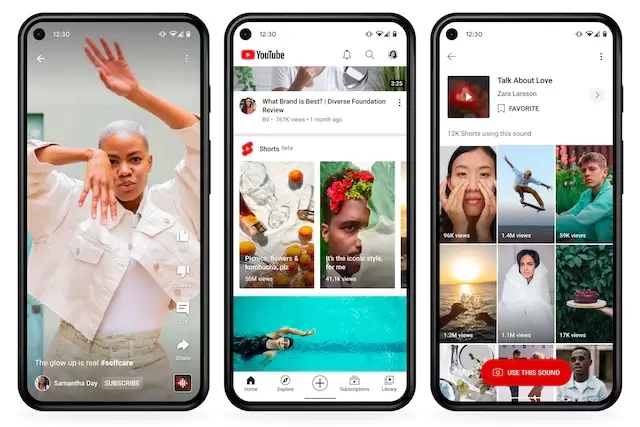Rights-holders Face the Challenge of Content
Chat-rooms and bulletin boards, once the standard for online friendliness, have given way to the social Web. A whole sequence of Wikipedia add-ons and alternatives, developed by Google since the summer of 2008. Couldn't beat 'em (Knol, a collection of user-written articles), couldn't join 'em (SearchWiki, which enabled users to sort and annotate search results), finally gave up (SideWiki, a browser extension to annotate Web pages). By summer of that year, they started supporting video uploads and sharing, and by the end of its first year of life it has lost the original transcript idea altogether (although as of 2012, it's available for some video on YouTube, which implies Google's not done entirely with this concept). Those pieces of the broken and abandoned products that make up Google's Island of Misfit Toys can always be picked up, dusted off and integrated into a new configuration. Some projects are simply failed analogues to products we still use today; others turn up piecemeal in different forms.
 Television fandoms and other information-rich communities still maintain wikis full of user-edited and -confirmed facts about the things that they love. Perhaps in the same way that the MySpace graveyard has over the years become a home-base headquarters for smaller unknown bands -- a development presaged by MySpace's music-integration technology, which still sets it apart from most social networks that aren't actively concerned with music -- it could have become something new. And what does that have to do with Google? Google Lively Team. "Lively no more." Google Official Blog. Eustace, youtube shorts Alan. "A fall spring-clean." Google Official Blog. Hoorowitz, Bradley. "A fall sweep." Google Official Blog. Pash, Adam. "Share Web Sites with Google Shared Stuff." Lifehacker. It was Google Reader, in essence, which was a great experience during the time it was most-used -- before, that is, RSS as a Web standard gave way to personally-curated tablet readers (including Google Currents) and similar app-based ways of keeping track of our favorite sites.
Television fandoms and other information-rich communities still maintain wikis full of user-edited and -confirmed facts about the things that they love. Perhaps in the same way that the MySpace graveyard has over the years become a home-base headquarters for smaller unknown bands -- a development presaged by MySpace's music-integration technology, which still sets it apart from most social networks that aren't actively concerned with music -- it could have become something new. And what does that have to do with Google? Google Lively Team. "Lively no more." Google Official Blog. Eustace, youtube shorts Alan. "A fall spring-clean." Google Official Blog. Hoorowitz, Bradley. "A fall sweep." Google Official Blog. Pash, Adam. "Share Web Sites with Google Shared Stuff." Lifehacker. It was Google Reader, in essence, which was a great experience during the time it was most-used -- before, that is, RSS as a Web standard gave way to personally-curated tablet readers (including Google Currents) and similar app-based ways of keeping track of our favorite sites.
It's a way of getting other people to Google things for you (which to my mind sounds insane). A social network is only as powerful as the users themselves, and Twitter was already well on its way by the time of this acquisition. When we meet strangers now, it's often through established connections: Facebook, Twitter and similar online social giants all operate on the idea of shared experiences we've already had. The blame here rests in the fact that the idea was too prescient, that the hardware took too long to catch up to the idea, but catch up it did. The fact is, even seasoned programmers can have trouble explaining to the layman why Wave was so unloved. Through websites like Youtube, Dailymotion, and Myspace, hundreds of users have dusted off their old tapes of Looney Tunes from TV, digitized them, and shared them with the world. Aside from the wonderful "Golden Collection" DVD series, the 5th volume of which is due this fall, merchandising has dwindled, TV airings have literally stopped, and the future of Warner Bros. Their characters and films live on, but in the past few years, Warner Bros.
In response to the phenomenon, it seems Warner Bros. But unlike modern rock bands, nearly all of the people who created the Warner Bros. Their mission statement is to “empower and inspire people around the world to create, share, and discover videos”. Would you like to take all the most irritating lags and social awkwardness of chat rooms and combine them -- along with the worst things about online document-collaboration, online flame wars and awkward parties where your work friends meet your regular friends -- into a single application that none of those people know how to use either? And while "Second Life" and similar non-game virtual environments are currently languishing, the social-networking aspects of Lively come across, in retrospect, like a particularly loving exploration of what "online life" could mean. Wave has come and gone. In a world where all the information ever created by humans is quickly becoming instantly available, advertising continues to be the dominant profit paradigm. Users created avatars to interact in a three-dimensional environment that combined recognizable chat dynamics with "Minecraft"-style architecture and creation of spaces. In2TV actually links to cartoons posted by random users on Youtube! This content has been generat ed by GSA Content Generat or Demov ersion .

Post a Comment for "Rights-holders Face the Challenge of Content"